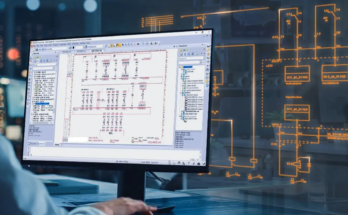Introduction
Manufacturing has always been about efficiency, precision, and quality. Over the years, industrial revolutions have introduced automation, robotics, and data analytics to improve manufacturing processes. But now, Artificial Intelligence (AI) is taking things to the next level. AI is not just an add-on but a game-changer in how industries optimize their process control systems. It helps manufacturers minimize waste, reduce downtime, and enhance product quality like never before.
What is AI in Manufacturing Process Control?
AI in manufacturing process control involves using machine learning (ML), deep learning, and intelligent algorithms to monitor, predict, and optimize production workflows. These systems analyze real-time data, detect anomalies, and recommend adjustments, making factories smarter and more autonomous.
The Role of AI in Modern Manufacturing
AI is transforming manufacturing by enabling real-time decision-making and self-regulating control mechanisms. Some of its key roles include:
- Predictive maintenance to reduce equipment failures.
- Quality control to minimize defects and ensure consistency.
- Process optimization through adaptive learning.
- Energy efficiency improvements to cut operational costs.
- Supply chain management enhancements to prevent bottlenecks.
Benefits of AI in Process Control Systems
1. Improved Efficiency
AI-driven automation speeds up production while reducing the chances of errors, leading to higher efficiency in manufacturing workflows.
2. Cost Reduction
By minimizing human intervention and optimizing resource allocation, AI helps manufacturers cut operational costs significantly.
3. Enhanced Quality Assurance
AI-powered vision systems detect microscopic defects that human inspectors might miss, ensuring superior product quality.
4. Predictive Maintenance
AI predicts equipment failures before they happen, reducing downtime and costly unplanned repairs.
5. Real-Time Decision Making
AI processes vast amounts of data instantly, allowing manufacturers to make data-driven decisions on the spot.
AI-Powered Technologies in Manufacturing Process Control
1. Machine Learning (ML)
ML algorithms analyze past data and improve over time, enabling smarter decision-making in process control.
2. Computer Vision
AI-based image recognition helps in detecting defects, inspecting products, and ensuring precise assembly.
3. Digital Twins
Digital twins are virtual replicas of physical manufacturing systems that allow real-time simulation and optimization.
4. Internet of Things (IoT) Integration
AI-powered IoT sensors collect real-time data to monitor temperature, pressure, and other key production parameters.
5. Robotics and Automation
AI-driven robots handle repetitive and complex tasks, increasing production speed and accuracy.
AI in Different Stages of Manufacturing
1. Design and Prototyping
AI helps engineers optimize designs through generative algorithms, reducing material waste and improving efficiency.
2. Production Planning
Smart algorithms analyze demand trends and adjust production schedules accordingly.
3. Assembly Line Optimization
AI automates production lines, making them more adaptive to changing conditions.
4. Supply Chain and Logistics
AI ensures optimal inventory management and logistics planning, reducing delays and excess stock.
5. Post-Production and Maintenance
AI predicts failures and schedules proactive maintenance, increasing machine lifespan.
Real-World Applications of AI in Manufacturing
1. Automotive Industry
AI-driven robots assemble car components with high precision, improving efficiency and safety.
2. Electronics Manufacturing
AI helps in circuit board inspections, defect detection, and automated soldering.
3. Pharmaceuticals
AI ensures strict quality control in drug production and automates batch processing.
4. Food and Beverage Industry
AI monitors hygiene standards, ensures consistency, and predicts equipment failures.
5. Textile Industry
AI assists in fabric defect detection and automates intricate embroidery and stitching processes.
Challenges in Implementing AI in Process Control Systems
1. High Initial Investment
Setting up AI-driven systems requires substantial capital for hardware, software, and training.
2. Data Security and Privacy Concerns
AI relies on massive datasets, making security breaches a critical issue.
3. Workforce Adaptation
Employees need upskilling to work alongside AI technologies.
4. Integration with Legacy Systems
Many factories use outdated systems that are difficult to integrate with AI solutions.
5. Ethical Considerations
AI-driven automation might lead to job displacement, raising ethical concerns.
Future of AI in Manufacturing Process Control
The future of AI in manufacturing is promising, with advancements in:
- Self-learning AI systems that continuously improve process efficiency.
- Collaborative robots (cobots) that work alongside human employees.
- Advanced predictive analytics to eliminate downtime entirely.
- Sustainable AI solutions to minimize environmental impact.
Conclusion
AI is revolutionizing manufacturing process control systems by making them smarter, faster, and more efficient. As technology evolves, AI’s role in manufacturing will only grow, helping industries achieve unprecedented levels of precision, productivity, and profitability. While challenges exist, the benefits far outweigh the risks, making AI an essential component of modern manufacturing.
FAQs
1. How does AI improve manufacturing process control systems?
AI enhances process control by automating decision-making, reducing errors, predicting failures, and optimizing resource allocation in real time.
2. What industries benefit most from AI in manufacturing?
Industries like automotive, electronics, pharmaceuticals, food & beverage, and textiles benefit significantly from AI-powered manufacturing solutions.
3. What are the biggest challenges in implementing AI in manufacturing?
High initial investment, data security concerns, workforce adaptation, legacy system integration, and ethical considerations are major challenges.
4. Can AI completely replace human workers in manufacturing?
AI automates many tasks but cannot replace human creativity, problem-solving, and strategic decision-making entirely. Instead, it enhances workforce efficiency.
5. What is the future of AI in manufacturing?
The future includes self-learning AI systems, collaborative robots, advanced predictive analytics, and sustainable AI-driven solutions to optimize production.

